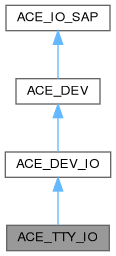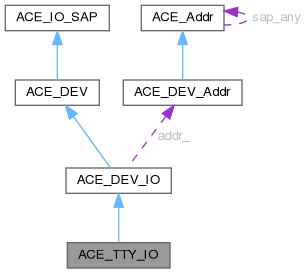Class definitions for platform specific TTY features. More...
#include <TTY_IO.h>
Inheritance diagram for ACE_TTY_IO:

Collaboration diagram for ACE_TTY_IO:

Classes | |
| struct | Serial_Params |
Public Types | |
| enum | Control_Mode { SETPARAMS , GETPARAMS } |
 Public Types inherited from ACE_DEV_IO Public Types inherited from ACE_DEV_IO | |
| typedef ACE_DEV_Addr | PEER_ADDR |
| Declare the dynamic allocation hooks. | |
 Public Types inherited from ACE_IO_SAP Public Types inherited from ACE_IO_SAP | |
| enum | { INVALID_HANDLE = -1 } |
Public Member Functions | |
| ACE_TTY_IO () | |
| int | control (Control_Mode cmd, Serial_Params *arg) const |
 Public Member Functions inherited from ACE_DEV_IO Public Member Functions inherited from ACE_DEV_IO | |
| ACE_DEV_IO () | |
| Default constructor. | |
| ssize_t | send (const void *buf, size_t n) const |
| send upto n bytes in buf. | |
| ssize_t | recv (void *buf, size_t n) const |
| Recv upto n bytes in buf. | |
| ssize_t | send_n (const void *buf, size_t n) const |
| Send n bytes, keep trying until n are sent. | |
| ssize_t | recv_n (void *buf, size_t n, const ACE_Time_Value *timeout=0, size_t *bytes_transferred=0) const |
| Declare the dynamic allocation hooks. | |
| ssize_t | send (const iovec iov[], size_t n) const |
| Send iovecs via <::writev>. | |
| ssize_t | recv (iovec iov[], size_t n) const |
| Recv iovecs via <::readv>. | |
| ssize_t | send (size_t n,...) const |
| ssize_t | recv (size_t n,...) const |
| ssize_t | send (const void *buf, size_t n, ACE_OVERLAPPED *overlapped) const |
| Send n bytes via Win32 WriteFile using overlapped I/O. | |
| ssize_t | recv (void *buf, size_t n, ACE_OVERLAPPED *overlapped) const |
| Recv n bytes via Win32 ReadFile using overlapped I/O. | |
| void | dump () const |
| Dump the state of an object. | |
| int | get_local_addr (ACE_DEV_Addr &) const |
| Return the local endpoint address. | |
| int | get_remote_addr (ACE_DEV_Addr &) const |
 Public Member Functions inherited from ACE_DEV Public Member Functions inherited from ACE_DEV | |
| int | close () |
| Close down the DEVICE. | |
| void | dump () const |
| Dump the state of an object. | |
| int | disable (int signum) const |
 Public Member Functions inherited from ACE_IO_SAP Public Member Functions inherited from ACE_IO_SAP | |
| ~ACE_IO_SAP () | |
| Default dtor. | |
| int | control (int cmd, void *) const |
| Interface for ioctl. | |
| int | enable (int value) const |
| int | disable (int value) const |
| ACE_HANDLE | get_handle () const |
| Get the underlying handle. | |
| void | set_handle (ACE_HANDLE handle) |
| Set the underlying handle. | |
| void | dump () const |
| Dump the state of an object. | |
Additional Inherited Members | |
 Public Attributes inherited from ACE_DEV_IO Public Attributes inherited from ACE_DEV_IO | |
| ACE_ALLOC_HOOK_DECLARE | |
| Declare the dynamic allocation hooks. | |
 Public Attributes inherited from ACE_DEV Public Attributes inherited from ACE_DEV | |
| ACE_ALLOC_HOOK_DECLARE | |
| Declare the dynamic allocation hooks. | |
 Public Attributes inherited from ACE_IO_SAP Public Attributes inherited from ACE_IO_SAP | |
| ACE_ALLOC_HOOK_DECLARE | |
| Declare the dynamic allocation hooks. | |
 Protected Member Functions inherited from ACE_DEV Protected Member Functions inherited from ACE_DEV | |
| ACE_DEV () | |
| Ensure that this class is an abstract base class. | |
 Protected Member Functions inherited from ACE_IO_SAP Protected Member Functions inherited from ACE_IO_SAP | |
| ACE_IO_SAP () | |
| Ensure that ACE_IO_SAP is an abstract base class. | |
Detailed Description
Class definitions for platform specific TTY features.
This class represents an example interface for a specific device (a serial line). It extends the capability of the underlying DEV_IO class by adding a control method that takes a special structure (Serial_Params) as argument to allow a comfortable user interface (away from that annoying termios structure, which is very specific to UNIX).
Member Enumeration Documentation
◆ Control_Mode
Constructor & Destructor Documentation
◆ ACE_TTY_IO()
| ACE_TTY_IO::ACE_TTY_IO | ( | ) |
Member Function Documentation
◆ control()
| int ACE_TTY_IO::control | ( | Control_Mode | cmd, |
| Serial_Params * | arg ) const |
Interface for reading/writing serial device parameters.
The documentation for this class was generated from the following files: